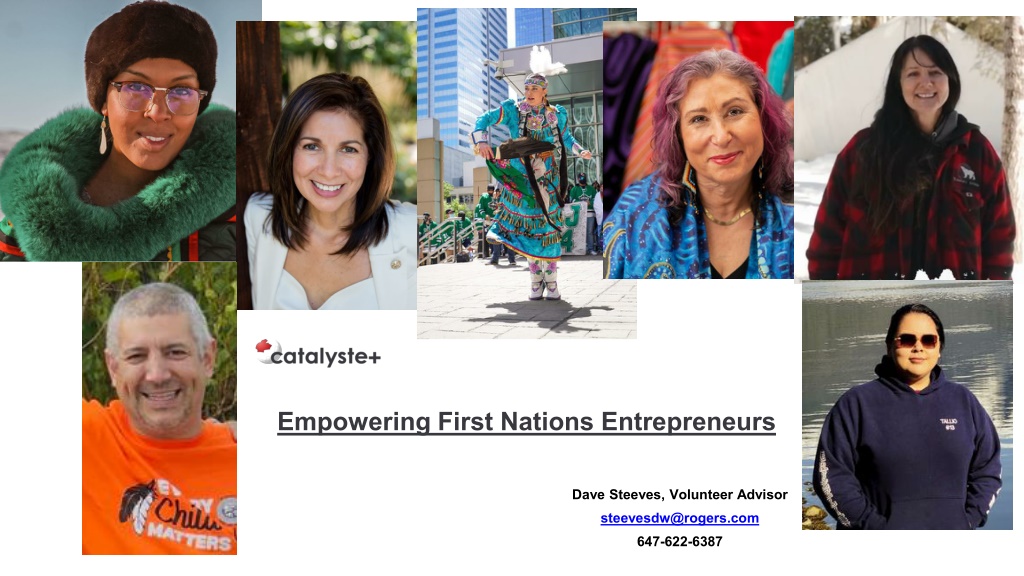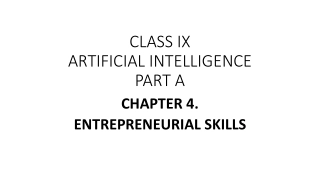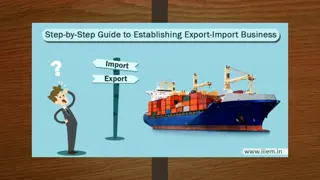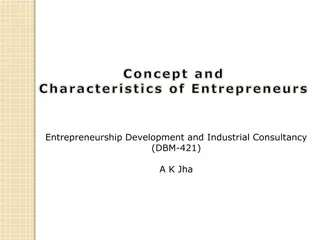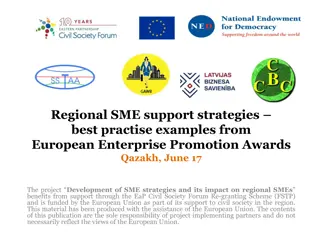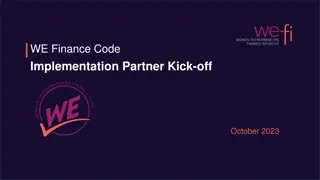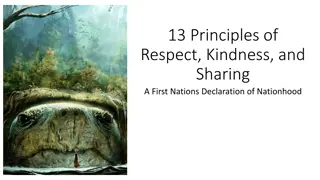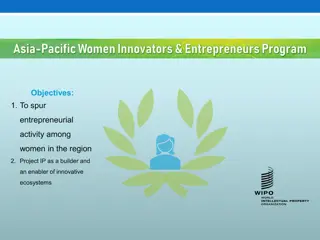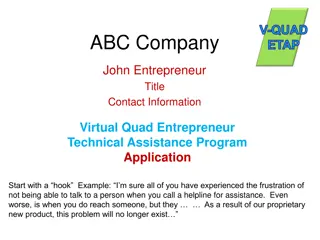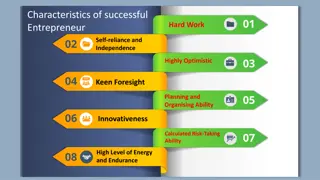Empowering First Nations Entrepreneurs
Empowering First Nations Entrepreneurs is a program by OFNEDA, a Canadian economic development organization, providing guidance and support to Indigenous entrepreneurs. The initiative matches Indigenous partners with experienced volunteer advisors to enhance capacity-building and facilitate community-led projects. The program focuses on understanding First Nations entrepreneurship, cultural values, and challenges while celebrating the distinct qualities of Indigenous entrepreneurs. By promoting innovation, resilience, and empowerment, the initiative aims to create a supportive ecosystem for Indigenous business owners.
Download Presentation

Please find below an Image/Link to download the presentation.
The content on the website is provided AS IS for your information and personal use only. It may not be sold, licensed, or shared on other websites without obtaining consent from the author.If you encounter any issues during the download, it is possible that the publisher has removed the file from their server.
You are allowed to download the files provided on this website for personal or commercial use, subject to the condition that they are used lawfully. All files are the property of their respective owners.
The content on the website is provided AS IS for your information and personal use only. It may not be sold, licensed, or shared on other websites without obtaining consent from the author.
E N D
Presentation Transcript
Empowering First Nations Entrepreneurs Dave Steeves, Volunteer Advisor steevesdw@rogers.com 647-622-6387
Long-term partner of OFNEDA Canadian economic development organization operating for over 50 years (est. 1967). Non-profit working with First Nations, Inuit, and M tis communities across Canada. Collaborate with First Nation governments, businesses and community organizations to strengthen capacity and support community led and community driven projects. We match Indigenous partners and clients with a Catalyste+ Advisor (approx. 150/yr) Volunteer Advisors are retired or semi-retired, come with 15+ years of experience in their respective fields, and many have spent their careers working with Indigenous communities and in Northern regions. Advisors see their work as contributing to reconciliation. Traditional Indigenous knowledge and your own experience are the foundation of the work we do together.
Understanding First Nations Entrepreneurship Sharing Success Stories and Observations Process Used in Building a Strong Foundation Outcome/Experiences Group Discussion Around Challenges Q&A and Discussion
What is an Entrepreneur? Entrepreneurs are individuals with their own unique strengths. They see opportunities and have the courage to go after them; they are willing to learn from their mistakes and are determined to try again; and they enjoy challenges and finding creative solutions to problems. There are many rewards to being a successful entrepreneur. You can run your business according to your values and beliefs. You can also make things happen in your community.
What Makes Indigenous Entrepreneurs Distinct... 1. Cultural Values and Traditional Knowledge 2. Connection to the Land 3. Community Orientation 4. Holistic Approach to Business 5. Cultural Identity and Representation 6. Challenges and Resilience 7. Innovation and Adaptation 8. Inclusive Business Models 9. Cultural Sensitivity in Business Practices 10. Entrepreneurship as a Means of Empowerment
Types of Entrepreneurs... Serial Entrepreneurs: These individuals repeatedly start, grow, and sell businesses. They thrive on the challenge of building and scaling companies. Social Entrepreneurs: Social entrepreneurs are driven by a desire to address social or environmental issues. They create businesses or organizations with a primary focus on positive social impact. Innovative Entrepreneurs: These entrepreneurs are known for their groundbreaking innovations and often bring disruptive technologies or business models to market. Small Business Entrepreneurs: Small business owners typically operate locally and are focused on providing goods or services to their communities. They may not seek rapid growth but aim for stability and profitability. Corporate Entrepreneurs (Intrapreneurs): These individuals work within large organizations and act as entrepreneurs within the corporate structure, driving innovation and new initiatives. Tech Entrepreneurs: Tech entrepreneurs focus on technology-driven ventures, such as software startups, hardware development, or tech services. Lifestyle Entrepreneurs: Lifestyle entrepreneurs prioritize achieving a work-life balance and create businesses that align with their personal interests and values (eg. Health/Wellness) Cultural Entrepreneurs: Cultural entrepreneurs promote and create cultural products or experiences, such as artists, musicians, tourism and designers.
Examples of Empowered Entrepreneurs: (and the process used to establish their businesses)
Business Summaries: Allurvik s mission is to provide educational services and fashion to connect its clients to the Inuit language and culture while delivering high quality consultation. (education services and retail) Ascension Today's mission is in providing experiential services to guide individuals along their spiritual pathway towards achieving personal balance and connection, supporting a healthier lifestyle. (health and wellness) Collective Wellness Pow Wow s mission is to strengthen the availability of culturally relevant supports for Indigenous peoples wellness through education, advocacy, consultation, program development and providing wellness services while bridging the gap with non-Indigenous communities. (health and wellness) Mystical M tis mission is to build bridges between cultures by welcoming visitors to explore our world and Indigenous ways through art and conversation. (retail) Painted Warriors mission is to build bridges between cultures by encouraging guests to immerse themselves in Indigenous ways of life. We share our traditional knowledge where guests discover new skills that transform their physical, emotional and spiritual connection to our people and the land. (tourism)
Common Qualities found in these Entrepreneur Clients: Strong cultural identity: The Indigenous entrepreneurs I worked with all had a strong connection to their culture and heritage ( All My Generations ), which guided their business practices and helped build relationships with customers and collaborators. Resilience and resourcefulness: Many faced significant barriers to entrepreneurship, such as limited access to funding and resources. Despite these challenges, they often demonstrated remarkable resilience and resourcefulness in pursuing their business goals. Community focus: Most of my clients prioritized community impact over individual profit, and all of them used their businesses as a way to give back to their communities and promote social and economic development. Creativity and innovation: All of my clients brought unique perspectives and creative solutions to the challenges they faced in business, drawing on their cultural heritage and lived experiences to develop innovative products and services. Collaborative approach: My experience has been that most Indigenous entrepreneurs value collaboration and seek to build partnerships with other businesses, organizations, and community members in order to achieve their goals.
Stages in Incubating a Start-up Requires Differing Leadership Styles: Ideation Courage Empathy Relationship/Team Building Business Development Creativity Collaboration Handling Adversity Launch/Accelerate Adapt Self Awareness/Confidence Key Timely Decision Making Growth Mindset Self Reflection
Initial Branding is Based On: Vision: Mission: The What! The How! Values: Who We Are!
Horizon 1/2/3 Priorities (3-6mos/6mos 1yr/1 3yrs) Goals Initiatives Desired Outcome Completion Date/Owner
Outcomes/Experiences with my Clients... All businesses continue to be successful going-concerns , led by confident and empowered entrepreneurs (some have launched, learned, re-launched). Successful mentorship requires TLC Trust, Leadership and Commitment Clients (and advisors) must go deep and live the process - exciting to see early fruits of their hard work. Proforma aha moment.. Facilitating networking/mentorships (eg. Paula-Nevada, Samaria-Tracey) along with recognition (eg. Catalyste+ blogs, ITAC marketing) are key to raising public profiles in their communities and inspiring others. Planning process can be used to gain accreditation (eg. ITAC Market-ready) and access to grants and Indigenous-based credit facilities.
Recap: My Experiences Working With Indigenous Entrepreneurs... Respect for Cultural Diversity Indigenous communities often have diverse cultures and traditions. Building relationships begins with a deep respect for this diversity. Understanding and appreciating different customs, languages, and ways of life are crucial. Cultural Sensitivity Be sensitive to cultural nuances and avoid imposing external values. Understanding the historical context and the impact of colonialism is crucial in developing a respectful and sensitive approach. Community Involvement In many indigenous cultures, community decisions are made collectively. Building relationships involves active participation and engagement with the community. Attend community events, participate in discussions, and contribute positively. Trust Building Trust is the foundation of any strong relationship. Building trust takes time and consistency. Be reliable, honest, and demonstrate a genuine commitment to the well-being of the community. Relationships First, Business Second In many indigenous cultures, relationships are prioritized over transactions. Take the time to build personal connections before jumping into business discussions. Invest in the relationship first, and the benefits will follow. Storytelling and Oral Tradition Many indigenous cultures place a strong emphasis on storytelling and oral tradition. Sharing stories is a powerful way to connect with others and convey important messages. Listening to the stories of others is equally important.
Cont... Collaborative Approach Indigenous communities often value a collaborative approach to problem-solving and decision-making. Building networks involves working together with others towards common goals. Foster a sense of collaboration rather than competition. Environmental Stewardship Many indigenous cultures have a deep connection to the land and a commitment to environmental stewardship. Demonstrating a shared commitment to environmental sustainability can be a powerful way to build common ground and shared values. Education and Awareness Promote education and awareness about indigenous cultures. This includes both within the community and externally. Increased understanding can lead to more meaningful and respectful relationships. Advocacy and Empowerment Support initiatives that empower indigenous communities. This could involve advocating for indigenous rights, supporting educational programs, or participating in economic development projects that are community-led.
Economic Development Can Support Entrepreneurs by: Promoting developmental, business-driven economic developments in the community; Enabling access to capital by providing diverse, tailored, developmental debt financing; Building the management capacity and business skills of it s entrepreneurs by providing necessary business planning, mentoring and management support services; Establishing partnerships and relationships with other Indigenous, public and private sector partners to enhance the developmental financing and support services; Managing and delivering related public and private sector programs and services.
Miigwech Questions?
Funding Options: 1. Bootstrapping: Bootstrapping involves using personal savings and revenue generated by the business to fund its growth. This approach allows entrepreneurs to maintain full control but may limit scalability. 2. Friends and Family: Borrowing money from friends or family members is a common way to secure initial capital. However, it can strain personal relationships if not managed carefully. 3. Personal Savings: Using your own savings to finance your business is a straightforward and low-risk option. It demonstrates commitment to potential investors. 4. Angel Investors: Angel investors are wealthy individuals who provide capital to startups in exchange for equity ownership. They often offer mentorship and connections in addition to funding. 5. Venture Capital: Venture capital (VC) firms invest in startups and high-growth companies in exchange for equity. VCs typically provide larger funding amounts but often require a significant share of ownership and may influence company decisions. 6. Crowdfunding: Entrepreneurs can raise funds from a large group of individuals via crowdfunding platforms like Kickstarter, Indiegogo, or equity crowdfunding platforms like Crowdcube. Different crowdfunding models exist, including rewards-based, donation-based, debt-based, and equity-based.
Funding Options (cont): 7. Bank Loans: Traditional bank loans or lines of credit can provide capital, especially for established businesses with a strong credit history. These loans typically come with interest and repayment terms. 8. Small Business Loans: In some countries, the SBA offers various loan programs that provide government- backed financing to small businesses, making it easier to secure loans from banks and other lenders. 9. Microloans: Microloan programs, often offered by nonprofit organizations and community lenders, provide smaller amounts of capital to startups and small businesses. 10. Grants: Some entrepreneurs may qualify for grants from government agencies, foundations, or private organizations. These grants don't require repayment but often come with specific criteria and restrictions. 11. Corporate Sponsorship and Partnerships: In certain industries, corporations may provide funding, resources, or expertise in exchange for access to your innovation or as part of a strategic partnership. 12. Business Incubators and Accelerators: Joining a business incubator or accelerator program can provide funding, mentorship, and resources to startups in exchange for equity or fees. 13. Initial Coin Offerings (ICOs) and Token Sales: For blockchain and cryptocurrency-based startups, ICOs and token sales allow them to raise capital by selling tokens or digital assets to investors.
Funding Options (cont): 14. Revenue Sharing: Some entrepreneurs negotiate revenue-sharing agreements with investors, where a portion of future revenues is paid back to investors until a predetermined amount is reached. 15. Convertible Notes: Convertible notes are a type of debt that can convert into equity when certain conditions are met, typically during a future funding round. 16. Supplier and Vendor Financing: Negotiating favorable payment terms with suppliers or vendors can provide working capital for the business.
Networking and Relationship Building: 1. Define Your Networking Goals: - Clarify your objectives for networking. Are you looking for career opportunities, mentorship, industry insights, or partnerships? Knowing your goals will guide your networking efforts. 2. Identify Your Target Audience: - Determine who you want to connect with based on your goals. This might include colleagues, industry peers, mentors, potential clients, or experts in your field. 3. Attend Networking Events: - Attend industry conferences, seminars, workshops, and meetups. These events provide opportunities to meet like-minded professionals and experts in your field. 4. Join Professional Organizations: - Become a member of relevant professional organizations and associations. These groups often host networking events, provide access to resources, and offer opportunities for leadership roles. 5. Leverage Social Media: - Utilize social media platforms like LinkedIn, Twitter, and industry-specific forums to connect with professionals in your field. Share valuable content and engage in discussions to establish your expertise.
Networking and Relationship Building (cont): 6. Build an Online Presence: - Create a professional online presence through a personal website or blog. Share your insights, expertise, and achievements to showcase your knowledge and skills. 7. Attend Workshops and Seminars: - Participate in workshops, seminars, and online courses related to your field. These educational events can help you acquire new skills and expand your network. 8. Volunteer and Give Back: - Offer your expertise or time to volunteer for industry-related projects, events, or charitable organizations. This allows you to contribute to your community while making connections. 9. Initiate and Nurture Relationships: - Actively reach out to professionals you admire or want to connect with. Send personalized messages expressing your interest in their work and your desire to connect. Follow up regularly to maintain relationships. 10. Be a Good Listener: - Listen attentively during conversations. Show genuine interest in others' experiences and perspectives. Being a good listener can help you build rapport and trust.
Networking and Relationship Building (cont): 11. Offer Value: - Be generous with your knowledge, expertise, and resources. Provide value to your network by sharing insights, recommendations, and introductions when appropriate. 12. Attend Alumni Events: - If you have attended a university or school, participate in alumni events and networks. Alumni often have a strong bond and are willing to help fellow graduates. 13. Keep Records: - Maintain a database or contact list of your professional connections. Include details about how you met, their areas of expertise, and any relevant notes to help you personalize future interactions. 14. Follow Up and Stay in Touch: - Consistently follow up with your connections to nurture relationships. Send occasional updates, articles, or messages to stay on their radar. 15. Practice Gratitude: - Express gratitude to those who have helped you along the way. A simple thank-you note or gesture can strengthen your connections.
Networking and Relationship Building (cont): 16. Seek Mentorship: - Identify potential mentors who can guide your career growth. Approach them respectfully and express your desire to learn from their experience.
